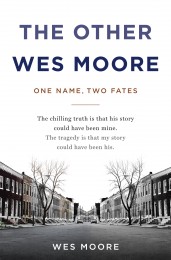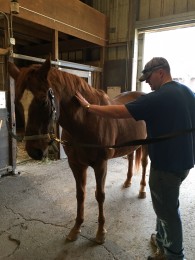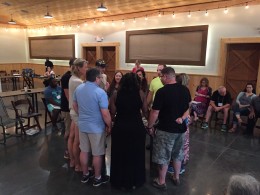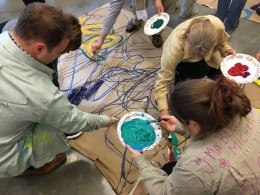 Author, decorated combat veteran and Rhodes scholar Wes Moore spoke Wednesday, Oct. 14, 2015, about the intentions and motives of his book, “The Other Wes Moore.” McCain Auditorium was filled with students, staff and faculty as Moore shared personal stories and motivated the crowd to see their higher education in a new way.
Author, decorated combat veteran and Rhodes scholar Wes Moore spoke Wednesday, Oct. 14, 2015, about the intentions and motives of his book, “The Other Wes Moore.” McCain Auditorium was filled with students, staff and faculty as Moore shared personal stories and motivated the crowd to see their higher education in a new way.
“Who will you stand for? What will you stand for when you don’t have to? Whose life will matter to you when it doesn’t need to? That is what your higher education is supposed to mean,” Moore said.
“The Other Wes Moore” focuses on two kids with the same name and similar upbringings. Both young men grew up fatherless in rough Baltimore, Maryland, neighborhoods, and often ran into trouble with police. Through a series of events, the fates of both men become very different. One grows up to be a decorated combat veteran, White House fellow and business leader, while the other is serving a life sentence for felony murder. The Institute for the Health and Security of Military Families, the Office of Military and Veteran Affairs, and other K-State entities assisted with the coordination of the lecture.
 As our military troops are deployed into war zones and unsettled areas, more soldiers are returning home and facing the challenges that occur with post-traumatic stress disorder. To improve the well-being of military families, Briana Nelson Goff, director of the Institute for the Health and Security of Military Families, has partnered with a team that offers retreats for post-9/11 service members and veterans dealing with PTSD. The institute and the team, known as the Invisible Wound Alliance, have developed, organized and hosted regional retreats for veterans and primary support persons, who attend the retreats with the veterans. In 2015, the institute and the alliance received funding from the Walter Reed Society, which has allowed them to expand the program. These retreats are titled “Bridging the Gap” because of the chasm that can open up between soldiers returning from deployments and their loved ones and communities. The Invisible Wound Alliance has been involved with developing the retreats program since 2011. The first Bridging the Gap retreat funded by the Walter Reed Society was in Washington, D.C., in December 2015, with a second in Chicago, Illinois, in March 2016, and a third in Manhattan, Kansas, in August 2016. The Walter Reed Society funding has allowed the program to rotate the areas where the retreats are organized to be accessible to veterans all over the nation.
As our military troops are deployed into war zones and unsettled areas, more soldiers are returning home and facing the challenges that occur with post-traumatic stress disorder. To improve the well-being of military families, Briana Nelson Goff, director of the Institute for the Health and Security of Military Families, has partnered with a team that offers retreats for post-9/11 service members and veterans dealing with PTSD. The institute and the team, known as the Invisible Wound Alliance, have developed, organized and hosted regional retreats for veterans and primary support persons, who attend the retreats with the veterans. In 2015, the institute and the alliance received funding from the Walter Reed Society, which has allowed them to expand the program. These retreats are titled “Bridging the Gap” because of the chasm that can open up between soldiers returning from deployments and their loved ones and communities. The Invisible Wound Alliance has been involved with developing the retreats program since 2011. The first Bridging the Gap retreat funded by the Walter Reed Society was in Washington, D.C., in December 2015, with a second in Chicago, Illinois, in March 2016, and a third in Manhattan, Kansas, in August 2016. The Walter Reed Society funding has allowed the program to rotate the areas where the retreats are organized to be accessible to veterans all over the nation. For each retreat, 10-12 pairs are selected, with veterans choosing the support person — spouse, sibling, parent or friend — to attend with them. During the retreats, participants receive psychological education about PTSD and are introduced to a variety of coping methods, such as yoga, art therapy, meditation, equine and canine therapies, and other complementary and alternative modalities. The institute provides the research and evaluation program for the retreats, conducting data collection on 10 retreats since 2013 and expanding to include biometric indicators of stress in the participants in 2016.
For each retreat, 10-12 pairs are selected, with veterans choosing the support person — spouse, sibling, parent or friend — to attend with them. During the retreats, participants receive psychological education about PTSD and are introduced to a variety of coping methods, such as yoga, art therapy, meditation, equine and canine therapies, and other complementary and alternative modalities. The institute provides the research and evaluation program for the retreats, conducting data collection on 10 retreats since 2013 and expanding to include biometric indicators of stress in the participants in 2016.